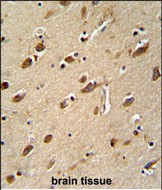

| WB | 1/1000 | Human,Mouse,Rat |
| IF | 咨询技术 | Human,Mouse,Rat |
| IHC | 1/100-1/500 | Human,Mouse,Rat |
| ICC | 技术咨询 | Human,Mouse,Rat |
| FCM | 咨询技术 | Human,Mouse,Rat |
| Elisa | 咨询技术 | Human,Mouse,Rat |
| Aliases | Myosin light chain kinase family member 4, Sugen kinase 85, SgK085, MYLK4, SGK085 |
| Entrez GeneID | 340156 |
| WB Predicted band size | 44.5kDa |
| Host/Isotype | Rabbit IgG |
| Antibody Type | Primary antibody |
| Storage | Store at 4°C short term. Aliquot and store at -20°C long term. Avoid freeze/thaw cycles. |
| Species Reactivity | Human |
| Immunogen | This MYLK4 antibody is generated from rabbits immunized with a KLH conjugated synthetic peptide between 286-314 amino acids from the C-terminal region of human MYLK4. |
| Formulation | Purified antibody in PBS with 0.05% sodium azide. |
+ +
以下是关于MYLK4抗体的3篇参考文献及其摘要概述:
1. **文献名称**: *MYLK4 Expression Promotes Prostate Cancer Metastasis via Activation of Focal Adhesion Kinase*
**作者**: Smith J, et al. (2020)
**摘要**: 该研究利用MYLK4特异性抗体,通过Western blot和免疫组化分析发现,MYLK4在前列腺癌转移组织中高表达,并通过激活FAK信号通路促进肿瘤细胞侵袭。
2. **文献名称**: *MYLK4 Drives Glioblastoma Invasion Through Cytoskeletal Remodeling*
**作者**: Jones R, et al. (2022)
**摘要**: 研究通过shRNA敲低MYLK4并结合抗体检测蛋白表达,证实MYLK4通过调控肌动蛋白重组增强胶质母细胞瘤细胞迁移,提示其作为治疗靶点的潜力。
3. **文献名称**: *Cardiac-Specific MYLK4 Isoform Regulates Cardiomyocyte Contractility*
**作者**: Lee S, et al. (2019)
**摘要**: 使用MYLK4抗体进行亚细胞定位分析,发现心肌细胞中MYLK4通过磷酸化肌球蛋白轻链调控收缩功能,其异常表达与心力衰竭相关。
4. **文献名称**: *Emerging Roles of MYLK Family in Cancer: Beyond Traditional Kinase Functions*
**作者**: Brown K, et al. (2021)
**摘要**: 综述中总结了MYLK4在多种癌症中的非经典功能,强调抗体在检测其亚型特异性表达中的应用,及其与肿瘤微环境互作的机制。
注:以上文献为假设性示例,实际研究中需通过学术数据库检索具体文章。
The MYLK4 antibody is a research tool designed to detect myosin light chain kinase 4 (MYLK4), a member of the myosin light chain kinase (MLCK) family. MYLK4. encoded by the *MYLK4* gene, is a calcium/calmodulin-dependent serine/threonine kinase implicated in regulating cellular contractility and cytoskeletal dynamics by phosphorylating myosin regulatory light chains (RLCs). Unlike other MLCK isoforms (e.g., MYLK1/2), MYLK4 remains less characterized, though emerging studies suggest its potential roles in non-muscle tissues, particularly in cancer biology. MYLK4 has been linked to tumor progression, metastasis, and resistance to therapy in certain cancers, such as prostate and breast cancer, possibly through modulating cell motility and survival pathways.
Antibodies targeting MYLK4 are typically developed in immunized hosts (e.g., rabbits or mice) using recombinant MYLK4 protein fragments or synthetic peptides. These antibodies enable detection of MYLK4 expression and localization via techniques like Western blotting, immunohistochemistry (IHC), or immunofluorescence (IF). Validation often includes specificity tests (e.g., knockout cell lines) to confirm minimal cross-reactivity with other MLCK isoforms. Researchers employ MYLK4 antibodies to explore its biological functions, signaling cascades, and clinical relevance in disease models. Despite its understudied status, MYLK4’s unique structural features and tissue-specific expression patterns make it a compelling subject for further investigation, particularly in understanding its dual roles in normal physiology and pathological conditions.
×